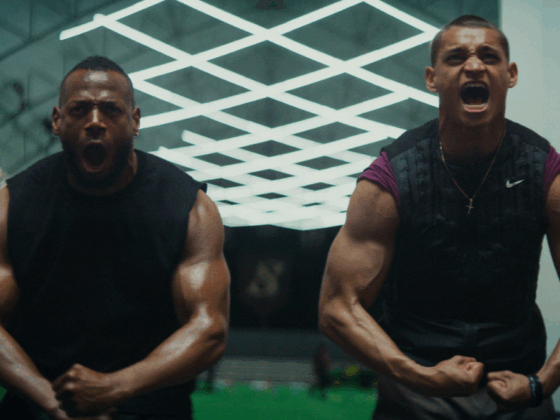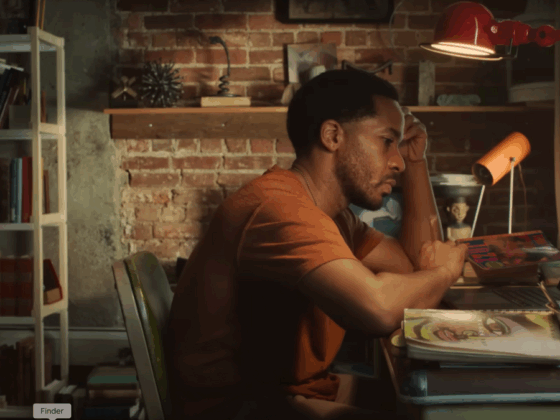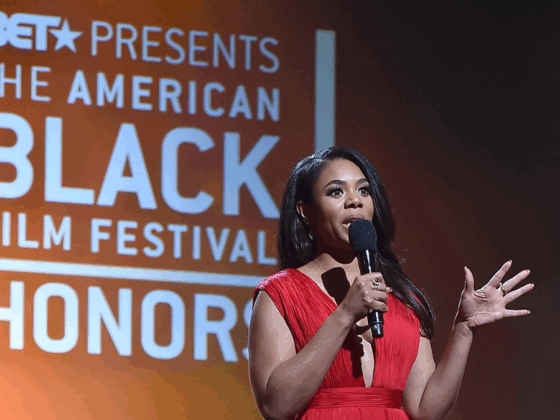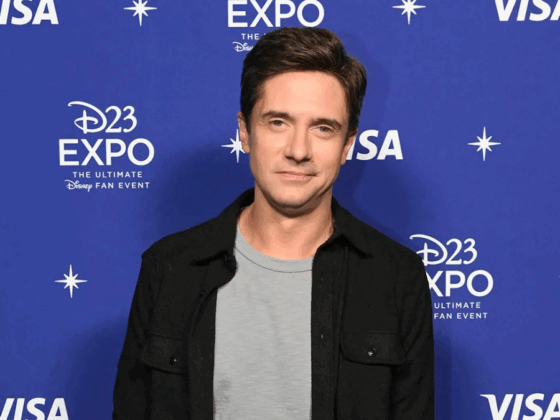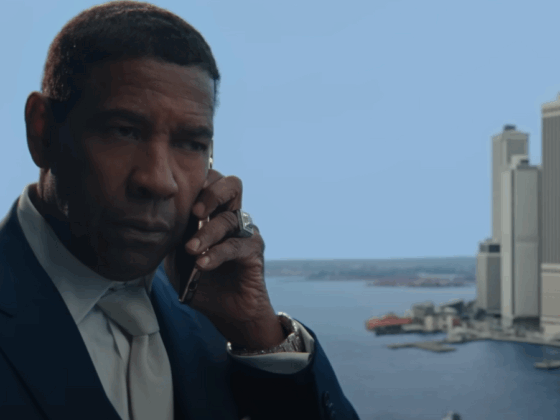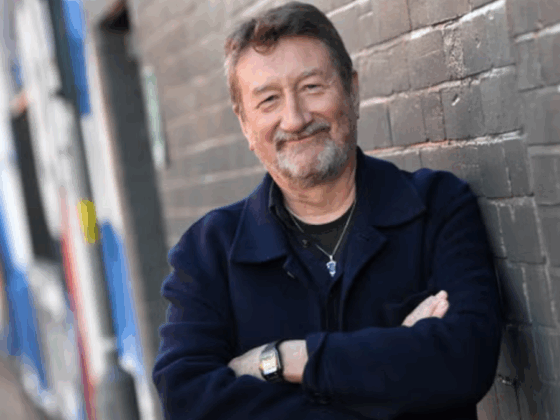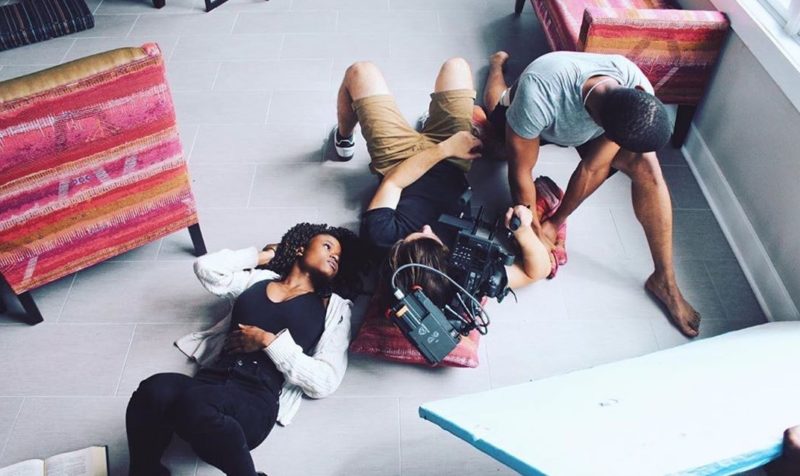
Oracle reports that the average attention span for an adult is eight seconds. Eight seconds is not long enough for many of us to make an informed decision or watch a thirty minute television episode of Insecure. While albums, movies and other forms of art continue to strain the average adult’s attention span, director Dominique Freeman is working to meet the public where it currently is.
For the past few years, the New Jersey native has built her own media platform, 60 Second Productions. In an effort to capture your attention for a short spurt, her team builds sixty-second films that tackle cultural issues while remaining entertaining and energetic. In the last few months, she’s stepped up her game and teamed up with Sirius XM’s Ryan Sampson to put together a COVID-19 PSA. Moving forward, she has dreams of developing feature films, but for the time being, she’s exactly where she hopes to be. In a short interview with Culture Editor Ryan Shepard, she discusses her goals, current projects and that one time she mediated a chaotic situation at a fashion event in New York.
What was the first moment in your life when you felt that film would be a major part of your career?
For me, it happened in college. I’ve always been into acting. I’ve always been into fantasies. Growing up, I liked watching movies that were not in this realm and were silly, like Twilight. Getting older, I watched Game of Thrones and [shows with] that kind of vibe. I’ve always been into fantasies and acting. I used to teach acting when I was in high school.
When I got into college, I had my first film class ever and the first project was to make a short film. So, I made this short film with a couple of students. It was a Halloween thriller. When I was on set, I knew it was going to be great. It made me feel free and I still love it. I felt like my first love. When I was on set, I had this euphoric moment. I’ve never felt [off set] how I do when I’m on set. Nothing feels better than that—sex, drinking, smoking, nothing. That is the best feeling there is.
Once that happened, I knew it was going to be great before the stuff was even edited or made. Then, we went to class and I won the best film in the class or whatever. At that point, I was like, “Okay, I’m going to keep going with this.”
When you started to get into film, was there some you looked up to or helped you along the way?
I feel like I’ve always had different mentors. One mentor who’s been helping me along the way is Jason Taylor. He produced a few of the X-Men movies. Issa Rae was also a big inspiration because she did what I’m trying to do which is making movies by herself, going to HBO, being like, “Hey, I’m great,” and then they picked her [show] up. Knowing that she could do it that way, it gave me more inspiration say that I could it that way too. She didn’t come from everything or whatever and neither did Jason. They both didn’t have much like that, but they paved the way.
At the same time, I try not to look too hard at other people’s stuff because I want everything to look natural. I know that’s not how it’ supposed to be. You’re supposed to study everybody’s work, analyze everything and know everything that everyone else gave before you. I still do that, but I want everything to feel very original, from me and from my heart. Watching other people’s work, you can accidentally take from them and I never wanted to do that. With that being said, I still do idolize Issa Rae and my mentor, Jason.
Over time, you’ve worked your way towards creating 60 Second Productions. What was the inspiration behind wanting to tell a story in that specific amount of time?
In general, I’ve always done short films because I felt like…I don’t know if this is true, but I’ve always felt like people that are up and coming are not going to watch your 15 minute film. Obviously, some people will, but unless you’re really coming out with all the stops, people are not going to sit there and watch a 15-20 minute film if you don’t have a theme or a background.
I was actually talking to my cousin, Kerry. He helped me with the first [film]. He does Urban Marketing for Sony Music. We were just bouncing off ideas and he was like, “You’ve got to just tell your story in that short amount of time.” I was like, “60 seconds?” He said, “Yeah, 60 seconds.” I took it and wanted to make it effective.
I started looking and I didn’t really see anyone really doing a 60-second series. When I was looking through Instagram, people weren’t really doing what I was thinking of doing. I just knew that if I wanted to capture the attention of these big Hollywood directors, [I had to start this series]. I felt like they just didn’t have the time to watch a 20-minute film unless you had a connection [to them]. I just wanted to make it feel as if you had watched an entire film in 60 seconds. I want you to connect with it fast and get the point across. I felt like dialogue is always great, but it’s always faster on set when you don’t have to use dialogue. You have your shot list and you go through motions. I don’t know, but it just feels like it’s easier to hold your attention [that way].
“When I’m directing, I definitely have that hustle energy.”
You spoke to it a bit in your previous answer. We live in a society where everyone’s attention span is shortening. From Twitter to TikTok, creatives are trying to grab everyone’s attention in the shortest amount of time possible. As a filmmaker, how difficult is it to condense a grandiose idea or concept into 60 seconds or less?
You’d think it would be more difficult [than it is]. I guess it is difficult. In general, film making is kind of difficult when you think about it. I guess I’ve always been used to the short film aspect, so I feel like it comes natural for me to do it in 60 seconds. I’ve always been writing down stories and always been interested in different aspects [of film]. Now, I’m getting more into editing and After Effects. I just feel like there’s just more of a range to tell my story and get my ideas across because I am teaching myself these things. I’m teaching myself After Effects and I’m teaching myself editing, so I’m expanding upon what I can do with this series. Now, I’m like, “Okay, what can I do in 60 seconds to portray this story?” That’s where I’m coming from with it. I think it’s just another challenge. There’s always a challenge in film, but this does feel natural to me. I genuinely want to tell a story in seconds. I do want to make feature films, but I do think what I do is cool. I’m definitely a big advocate for different ideas, so I’m trying to execute this as best as possible.
Aside from working in films, you also work in event production. You have worked on New York Fashion Week events and Madison Square Garden productions. I can imagine that working on a film set has similarities to managing an event. What, if any, skills do you take from working in event production that you can apply to film production?
I can definitely take skills from the pre-planning and administration aspects of event production and apply them to film production. Everything I do with shot lists, scripts, and equipment lists definitely has similarities to the pre-planning process of events. Then, event day is similar to shoot day because it’s just so intense. I mean…events are probably more intense than films.
On event day, you’re going around, seeing where everyone’s places are, seeing what has to be done and making sure that all aspects of the event [are taken care of]. Recently, I worked on an award show at Carnegie Hall. We had to take care of the run of show and make sure that all of the VIPs came on time. We also had to make sure the presenters were on time had the scripts they were supposed to read on stage. There was a lot of running around and movement. The biggest takeaway I have from the production side is developing that hustle energy.
When I’m directing, I definitely have that hustle energy. I invite you to come to a set one day. I definitely have to bring that aggressive energy, but I’m also there for everyone at the same time. I’m going up to everyone and asking, “Are you okay? How are you?” I’ll have my teammates walk around and make sure that all of the actors feel good and comfortable. In this job, I definitely have that hustle mentality and provide a point of context for everyone. I try to be that person that people can rely on and make them feel comfortable.
My experience working in event production came through the music industry. I worked at different concert venues in Washington, D.C. I’ll never forget the day that an artist who will remain nameless, had glue sticks on their rider. For whatever reason, it was impossible to find glue sticks on the day that they were supposed to perform. I ended up going to more than eight stores trying to find glue sticks. It was this simple task, but it just ended up being nearly impossible that day. I tell that story to ask you this. Has there ever been a moment in film or event production when you had to get something done, but you didn’t know how you were going to get it done?
Oh, my God! It happens all the time. For film, I was working on a shoot for a real estate company called Bedminster Farms. We were doing a promo video for a children’s center. Basically, we were in a place to shoot, but we were having some issues with the location. It wasn’t as structured as a Carnegie Hall for example. While we were working there, we had contracts for this and that, so we knew what we could use each day. On this shoot, it was more of a handshake type of deal. It was like, “Hey, you can use it. Let’s have a handshake on it. I’ll see you there. We’ll see what happens.” That made it difficult for me because nothing was genuinely solidified because of my boss’s friendship [with the location’s owner]. I don’t really know them and my boss wasn’t going to be on set the whole time.
When I got to the set, there were horses, trained dogs, etc. The woman who was running the horse bard was like, “I don’t want anyone getting on the horse. I don’t want anyone touching the horse. I don’t think you all should be here that long.” Meanwhile, I’m trying to get to everyone to the set and direct as well as let her know that we need the horses because the shoot is about the farm, children’s center, equestrian, etc. For whatever reason, this woman was not letting us use it. So, I had to?it’s kind of bad, but I had to get one of my PAs to distract the woman by asking her questions outside. While she was doing that, I had to get one of the actors, get them on the horse and be like, “Okay, let’s hurry up. Let’s get this shot! Let’s get this shot!” I was rushing everybody. It was so annoying. I was just rushing everybody to get the shot before she came back, but of course, she came back while we were still filming. She was devastated. I had to tell her that we needed it and explain everything about the shoot. I had to call the boss and everything, but it all worked out at the end of the day.
I guess you just always have to be able to certain things. People always say that they want you to have certain things or they want you to do certain things, but when it comes down to it people change. You have to hustle to do what you need to do to get the shot.
I’m trying to think of an event one. I think my event ones are kind of cute. I don’t know. There was one time when we had to plan a fashion event in New York and a famous rap group that I won’t name was supposed to perform. Apparently, the members hate each other I guess. They got on stage and one of the members of the group was a little bit wilder than the other I guess. The other member was a bit more into faith and everything like that. Basically, they had a 30 second change or whatever while I was on stage. I was on stage right with one of them when they were trying to change, but that person started to throw up. After the performer finished throwing up, they still needed to do an outfit change, so that they could go back out on stage. Meanwhile, the other member was pissed and they fought in the back. I guess in that situation I had to try to mediate between the two. I had to make sure that both parties were good and that their assistants were with them at all times to make sure that they were comfortable. There wasn’t much I could do about it because they’re celebrities, but I still had to make sure that I was on my P’s & Q’s.
One project that you’re working on that will hopefully avoid any hiccups is a COVID-19 PSA with Ryan Sampson of Sirius XM. Given the current health crisis, what has the process been like putting that together and what do you hope the final product will look like?
I’m excited about this one actually. I think that this one is going to be very clean and easy flowing. The hardest part about doing this shoot was getting a child actress. That’s definitely the hardest part. COVID-19 is definitely working against me. It can be hard getting actors and actresses when everyone’s afraid of the virus.
This shoot will definitely highly the importance of staying home during the pandemic, but we also want it to be fun and entertaining. Definitely, the hardest part was getting the child. I feel like everything is solidified and in place. This is probably the easiest shoot that I have put together so far. We just had to move the date because of the production ban, but after that, I think once it comes together, it will be really quick. I think it’s going to be good. We’re going to be doing some green screen effects. It’s a simplistic idea; it’s a simple shot, but it’s going to be impactful when it comes together. Hopefully, when I edit it all down, it will be amazing. I think it will be too.
I have high hopes for Ryan. It’s going to be good for him because he wants to do more on-screen stuff outside of his radio work. It’s a win-win.
To learn more about Dominique Freeman or 60 Second Productions, connect with them on Instagram.
Editor’s Note: The names of the performers involved in an altercation at a fashion event in New York have been removed for legal reasons.
